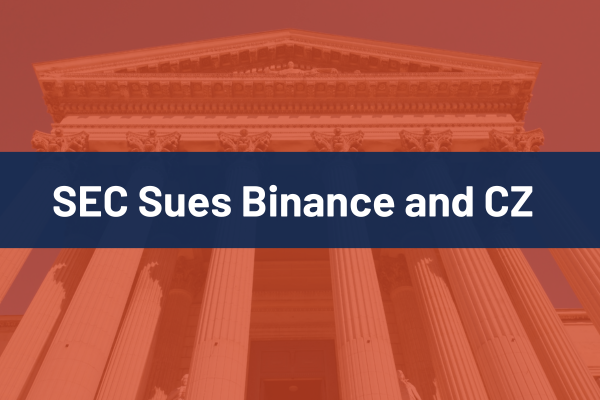The United States Securities and Exchange Commission (SEC) is coming after Binance, the world’s largest cryptocurrency exchange.
The SEC recently announced that it has filed 13 charges against Binance Holdings Ltd., its U.S.-based affiliate BAM Trading Services Inc., and their founder, Changpeng Zhao. These charges range from operating unregistered exchanges, broker-dealers, and clearing agencies to misrepresenting trading controls and oversight on the Binance.US platform, along with the unregistered offer and sale of securities.
Let’s break down the SEC’s allegations against Binance, their significance, and the potential implications for the cryptocurrency industry.
What Do the SEC’s Charges Against Binance Mean?
Operating Unregistered Exchanges, Broker-Dealers, and Clearing Agencies
The SEC’s complaint alleges that Binance.com and Binance.US, under the control of Changpeng Zhao, operated as exchanges, brokers, dealers, and clearing agencies. The SEC asserts that Binance should have registered as an exchange, broker-dealer, and clearing agency for Binance.com, and Binance and BAM Trading should have registered as an exchange and clearing agency for Binance.US.
Furthermore, BAM Trading should have registered as a broker-dealer. Changpeng Zhao is held liable as a control person for these registration violations.
Unregistered Offer and Sale of Crypto Assets
Binance is charged with the unregistered offer and sale of its own crypto assets, including BNB (Binance Coin) and BUSD (Binance USD), along with certain crypto-lending products known as “Simple Earn” and “BNB Vault.” Additionally, BAM Trading is charged with the unregistered offer and sale of Binance.US’ staking-as-a-service program. The SEC claims these assets qualify as securities.
The SEC’s complaint highlights Binance’s secret control over assets staked by U.S. customers in BAM’s staking program.
Failure to Restrict U.S. Investors from Accessing Binance.com
The SEC alleges that Binance and Changpeng Zhao created BAM Management and BAM Trading to evade U.S. federal securities laws by claiming that BAM Trading operated the Binance.US platform independently, thereby prohibiting U.S. customers from accessing Binance.com.
However, the complaint reveals that Zhao and Binance maintained substantial involvement and control over the U.S. entity, allowing high-value U.S. customers to continue accessing Binance.com. Internal messages from Binance’s chief compliance officer further support these allegations.
Misleading Investors
The SEC’s complaint asserts that BAM Trading and BAM Management misled Binance.US customers and equity investors regarding the existence and adequacy of market surveillance and controls to detect and prevent manipulative trading on the platform. The complaint also highlights the strategic wash trading carried out by Sigma Chain, the undisclosed market-making trading firm owned by Changpeng Zhao. The SEC claims that this deceptive activity undermines the credibility of BAM Trading’s claims about market surveillance and controls.
What Are the Potential Consequences for Binance?
The SEC’s charges against Binance and Changpeng Zhao carry significant implications and potential consequences for the crypto exchange. If found guilty, Binance could face a range of penalties and outcomes, including:
- Monetary Penalties: Binance may be required to pay substantial fines and disgorgement of ill-gotten gains resulting from the alleged violations. Given the size and revenue of the exchange, the financial impact could be significant.
- Injunctions and Cease-and-Desist Orders: The SEC could seek injunctions to prohibit Binance from engaging in certain activities or operations until it demonstrates compliance with securities laws. Additionally, the agency may issue cease-and-desist orders, which would require Binance to halt specific actions or practices.
- Regulatory Compliance Obligations: If the charges are proven, Binance may be subject to heightened regulatory scrutiny and obligations going forward. This could involve implementing robust compliance programs, conducting regular audits, and ensuring transparency in its operations.
- Legal Remedies from Affected Investors: If investors have suffered financial losses or damages as a result of Binance’s alleged misconduct, they may pursue legal action against the exchange. This could result in additional financial liabilities and reputational damage.
It is important to note that these are potential consequences and the final outcome will depend on the legal proceedings and the evidence presented. Binance will have an opportunity to defend itself and address the allegations made by the SEC.
What Does the SEC vs. Binance Lawsuit Mean for the Crypto Industry?
The SEC’s charges against Binance and Changpeng Zhao represent a significant development in the regulation of the cryptocurrency industry. This lawsuit underscores the SEC’s commitment to enforcing securities laws and protecting investors in the evolving landscape of digital assets. It serves as a reminder to all market participants of the importance of compliance with regulatory frameworks and transparent operations.
Is Your Crypto Business SEC Compliant?
At Gordon Law Group, we understand the complexities of SEC compliance for cryptocurrency exchanges. Our experienced team can guide your organization through the regulatory landscape, ensuring compliance with securities laws and mitigating potential risks. Contact us today to learn how we can assist your crypto exchange in meeting regulatory requirements and avoiding the SEC’s crypto crusade!




